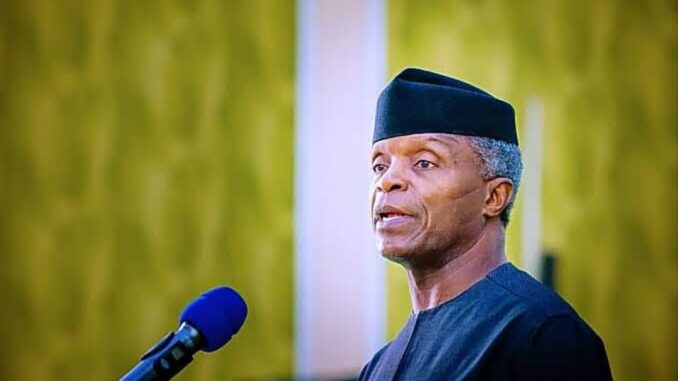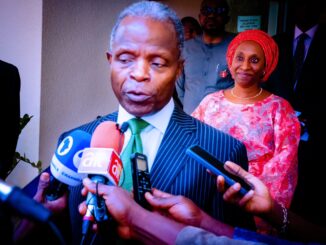
By Gideon Maxwell
June 16, 2025
Former Vice President of the Federal Republic of Nigeria, Yemi Osinbajo, has called for a transformative shift towards sustainable housing practices to address both the climate crisis and the growing lack of access to affordable shelter.
Osinbajo made the call at the 75th International Real Estate Federation (FIABCI) World Real Estate Congress hosted by the Nigeria Chapter in Lagos recently.
Delivering his keynote address, Osinbajo said: “Every profession that addresses fundamental human needs must reach beyond profit. In healthcare, for example, one will not applaud a doctor who says, ‘I only do this for money.’ Why? Because he deals with fundamental human problems, life and death. The service of a doctor carries moral weight, and so it must be with real estate as well, especially because it is about shelter, a basic human necessity.”
He continued: “The opportunity to be a professional in providing homes cannot be just business. It simply cannot just be business because it carries an important social and civic responsibility, providing shelter for all.”
Osinbajo urged real estate practitioners to focus on the millions in Africa, particularly in Nigeria, who remain without decent homes.
He said: “Practitioners should think about the majority, the millions, especially in the global south, particularly Africa, who are still without decent homes to live in and to provide for their families.
“Nigeria is growing by six million yearly; that is like adding Liberia to our country yearly. That means six million will need shelter, stability and dignity. Yet, in many countries of the Global South, like us, the dream of home ownership is out of reach.
“Every human and family that they make deserve a home, a decent, healthy place for self and family. But that simple expectation of life is complicated first by the availability of homes, which itself is a function of affordability.”
He painted a stark picture of Africa’s rapid urbanisation and housing crisis: “Africa is urbanising rapidly; by 2050, more than 60 per cent of our population will actually live in cities. Yet we already face a housing deficit of over 50 million units. Aside from affordability, we have the effect of the twin crisis of climate and conflict, and both have continuously destroyed existing housing stocks and hindered the building of urban houses and homes to replenish the stock that is being depleted.”
For Osinbajo, the moral imperative of housing extends beyond economics: “Housing is not a luxury, nor is it just an asset class; it is a right, a platform for dignity, stability and opportunity. We must see both the opportunity and the responsibility in providing homes for all.
So, the real estate practitioner is more than a builder of homes or places of commerce. You are a visionary architect of the society itself, and you are called to lay the foundation for equity, to raise the world that shelters dignity, and to shape communities that are resilient, inclusive and alive with opportunity. Your works don’t just create spaces but actually create the future.”
Echoing Osinbajo’s sentiments, FIABCI Nigeria’s President, Akin Opatola, stressed that real estate is fundamentally about people and progress.
He said: “Real estate is not just about buildings but about people and progress.”
He added: “Lagos is a city full of energy and potential, ready to lead the way in innovation and sustainable development.”
FIABCI World President, Ramon Riera, also spoke at the event through a message delivered to the participants. He described the congress as a pivotal moment for both Africa and the global property market. He said: “This congress marks a turning point, not just for Africa, but for the global property market.”
He continued: “Lagos, with its fast growth and vibrant culture, is the perfect place to explore new ideas in real estate and push for a more inclusive, eco-conscious future.”
The congress brought together stakeholders from around the world to discuss innovative solutions for sustainable, affordable, and inclusive housing in the face of climate challenges, urbanisation, and economic pressures.




